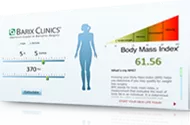High cholesterol, a condition that plagues many overweight Americans, is critical to a person’s heart health. This condition is doubly dangerous because it usually shows no signs or symptoms. To help you understand if you’re at risk, we identified exactly what you need to know about high cholesterol.
Are people who suffer from morbid obesity at greater risk of high cholesterol?
People who are obese are, in fact, at greater risk of developing high cholesterol. Lack of exercise, poor eating habits and excess weight are all factors that increase the likeliness of high blood cholesterol. Women are at a higher risk, too. The National Heart, Lung and Blood Institute reports nearly one in two women have high or borderline high cholesterol.
Can bariatric surgery help high cholesterol?
People who suffer from morbid obesity may choose to pursue weight loss surgery. The Mayo Clinic notes that losing as little as 5 to 10 percent of your weight can improve cholesterol levels. Bariatric surgery is associated with extreme weight loss and is known to reduce (or even cure) high cholesterol problems.
Unsure about the benefits of weight loss surgery for high cholesterol? Read Jamie’s success story. Jamie found herself dealing with a variety of weight-related health problems — including high cholesterol — while she was still quite young.
“Although I was only 24 when I had the surgery, my extra weight was already beginning to take a toll on my health,” Jamie says. “My blood pressure and cholesterol were elevated. I had problems with my back. I knew these problems were just going to get worse. [After surgery] I look in the mirror and I can’t believe it’s me. I’m so much happier and healthier.”
What is high cholesterol?
Cholesterol, a fatty substance found in our blood, comes from two sources: the body’s natural production of cholesterol and the food a person eats. The body makes all the cholesterol that we need — when we eat too many foods that include cholesterol, problems can arise.
There are two types of cholesterol:
LDL cholesterol: LDL cholesterol, known as the “bad” cholesterol, develops as a result of overeating. When people have too much bad cholesterol, it starts to build up in their arteries.
HDL cholesterol: HDL cholesterol, known as the “good” cholesterol, is produced naturally and travels through the body to remove harmful cholesterol. HDL cholesterol can be generated by exercise, eating foods like olive oil and whole grains that are high in good cholesterol or pursuing weight loss solutions.
How do you know if you have high cholesterol?
High blood cholesterol itself doesn’t produce symptoms. Many people are not aware they have the condition until they are tested by a doctor or it begins to affect their health directly. Blood cholesterol should be measured at least once every five years.
If you’re suffering from morbid obesity or if high blood cholesterol runs in your family, it’s best to speak with a doctor. In most cases, your doctor will choose to prescribe you a blood test called a lipoprotein profile to find out your cholesterol numbers. The categories for LDL (bad) cholesterol level are generally:
Optimal: Less than 100 mg/dL
Near optimal: 100-129 mg/dL
Borderline high: 130-159 mg/dL
High: 160-189 mg/dL
Very high: 190 mg/dL and above
What happens if you don’t treat high cholesterol?
LDL cholesterol builds up in the arteries over time. This buildup causes a hardening of the arteries, which can lead to heart and blood flow problems. Your chances of developing heart disease or having a heart attack increase as your LDL cholesterol levels go up.
There’s a high cholesterol solution for you.
Barix Clinics offers surgical weight loss solutions to help you gain control of your weight and learn healthy eating habits. Contact us today.





